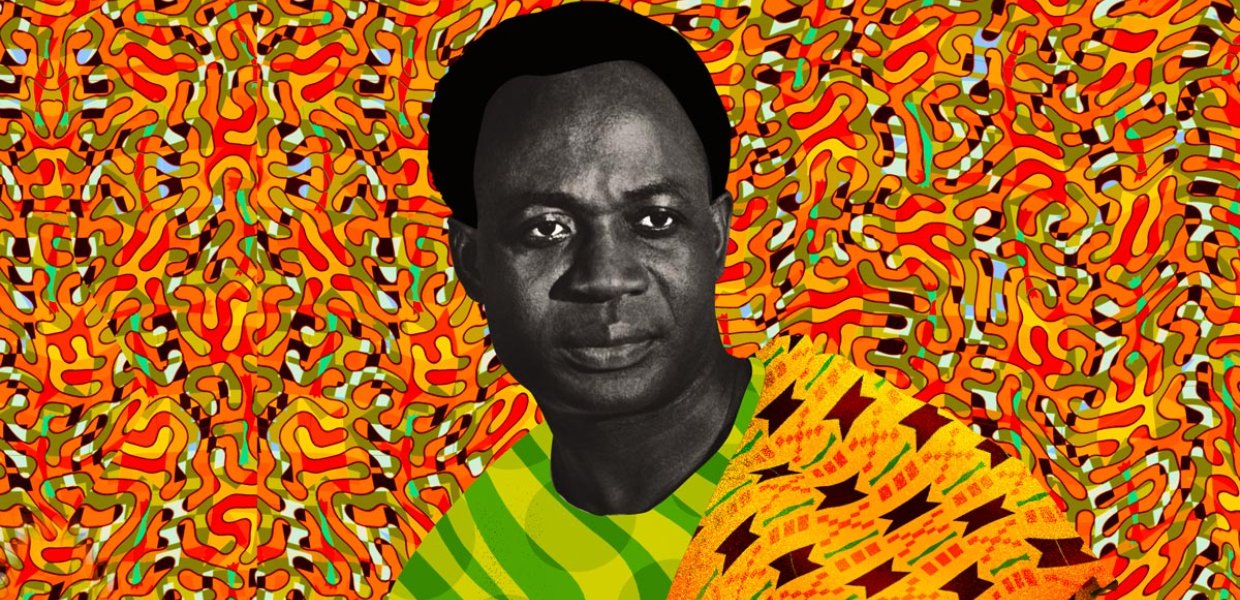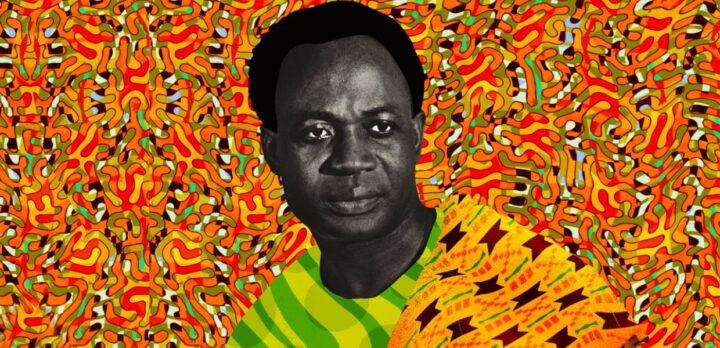Introduction
Kwame Nkrumah stands as one of the most significant figures in the history of African independence and Pan-Africanism. His life and political career encapsulate the struggles and aspirations of a continent striving to free itself from the shackles of colonialism.
Nkrumah’s vision extended beyond the borders of Ghana, the country he led to independence in 1957; he envisaged a united Africa that could stand on its own in the global arena. This essay will explore Nkrumah’s early life, his rise to political prominence, his contributions to Ghana’s independence, his Pan-Africanist ideology, and his enduring legacy.
Early Life and Education
Kwame Nkrumah was born on September 21, 1909, in Nkroful, a small village in the British colony of the Gold Coast, now Ghana. He was born into a modest family, but his mother, Nyanibah, played a crucial role in nurturing his early intellectual development. Recognizing his potential, his family ensured that Nkrumah received a good education, a rarity for many in the colony at the time.
Nkrumah attended Achimota School in Accra, where he excelled academically and became deeply interested in the nationalist ideas that were beginning to circulate among the educated elite in the Gold Coast. His teachers, recognizing his talent, encouraged him to pursue higher education abroad. In 1935, Nkrumah traveled to the United States, where he enrolled at Lincoln University in Pennsylvania. It was in the U.S. that Nkrumah’s political consciousness was fully awakened.
Political Awakening in the United States
During his time in the United States, Nkrumah immersed himself in the study of political philosophy, sociology, and economics. He was deeply influenced by the writings of Karl Marx, Vladimir Lenin, and Marcus Garvey, the Jamaican-born leader of the Pan-African movement. Garvey’s ideas about African unity and self-reliance resonated strongly with Nkrumah, who began to envision a similar movement for the African continent.
Nkrumah also became involved in the African American civil rights movement, forming connections with prominent leaders such as W.E.B. Du Bois and George Padmore. These relationships further shaped his understanding of the global struggle against racism, colonialism, and imperialism. During this period, Nkrumah developed his ideas about the interconnectedness of the African diaspora and the need for a united front against oppression.
Return to Africa and the Struggle for Independence
In 1947, Nkrumah returned to the Gold Coast, where he was invited to join the United Gold Coast Convention (UGCC), a political organization advocating for self-government. However, Nkrumah quickly became frustrated with the UGCC’s gradualist approach and its focus on elite interests. In 1949, he broke away from the UGCC to form the Convention People’s Party (CPP), a mass-based party that called for immediate independence and mobilized the broader population, including workers, farmers, and the urban poor.
Nkrumah’s slogan, “Self-Government Now,” electrified the masses and led to widespread protests and strikes. The colonial authorities responded by arresting Nkrumah and other CPP leaders, but this only served to increase his popularity. In 1951, while still in prison, Nkrumah’s CPP won a decisive victory in the Gold Coast’s first general election. The colonial government was forced to release him, and Nkrumah became the leader of government business, effectively the prime minister of the colony.
Ghana’s Independence and Nkrumah’s Vision
On March 6, 1957, the Gold Coast officially gained its independence, becoming the nation of Ghana, with Nkrumah as its first prime minister and later its president. Ghana’s independence was a watershed moment in African history, marking the first time a sub-Saharan African country had successfully thrown off the yoke of colonialism. Nkrumah declared, “The independence of Ghana is meaningless unless it is linked up with the total liberation of Africa,” signaling his broader vision for the continent.
Nkrumah’s vision for Ghana was one of rapid modernization and industrialization. He embarked on an ambitious program of infrastructure development, building roads, schools, hospitals, and the Akosombo Dam, which provided hydroelectric power. Nkrumah also sought to diversify Ghana’s economy, reducing its reliance on cocoa exports by investing in manufacturing and other industries.
However, these efforts were not without challenges. Nkrumah’s focus on rapid development led to significant borrowing, which burdened the country with debt. Additionally, his government’s increasing centralization of power and suppression of political opposition alienated many of his former allies and created internal dissent.
Pan-Africanism and Continental Unity
While Nkrumah worked tirelessly to develop Ghana, his ultimate goal was the political and economic unity of Africa. He was a leading proponent of Pan-Africanism, believing that the only way for Africa to achieve true independence and prosperity was through unity. Nkrumah argued that the artificial borders created by colonial powers divided African peoples and weakened their ability to resist external exploitation.
In 1963, Nkrumah played a pivotal role in the founding of the Organization of African Unity (OAU), the precursor to the African Union. The OAU aimed to promote solidarity among African states, support liberation movements, and coordinate economic development. However, Nkrumah’s vision of a United States of Africa, with a single government and economy, faced resistance from other African leaders who were wary of ceding national sovereignty.
Despite these challenges, Nkrumah continued to advocate for African unity. He believed that Africa’s future depended on its ability to transcend colonial legacies and build a continent-wide federation that could compete on the global stage. His writings, particularly “Africa Must Unite” (1963) and “Neo-Colonialism: The Last Stage of Imperialism” (1965), laid out his vision for a unified, socialist Africa that could resist neocolonial pressures from the West.
Downfall and Exile
Nkrumah’s bold vision and uncompromising leadership style made him both a revered figure and a controversial one. His government’s increasingly authoritarian tendencies, including the passage of the Preventive Detention Act, which allowed for the imprisonment of political opponents without trial, fueled growing domestic opposition.
Additionally, Ghana’s economic difficulties, exacerbated by falling cocoa prices and mounting debt, further eroded his support.
In February 1966, while Nkrumah was on a state visit to North Vietnam and China, his government was overthrown in a military coup. The coup was orchestrated by elements within the Ghanaian military and police, with the alleged support of Western intelligence agencies, who viewed Nkrumah’s socialist policies and alignment with the Soviet Union as a threat to their interests in Africa.
Nkrumah never returned to Ghana, spending the remainder of his life in exile in Guinea, where he was given the honorary title of co-president by President Ahmed Sékou Touré. Despite his exile, Nkrumah continued to write and advocate for African unity until his death. His death was on April 27, 1972, in Bucharest, Romania, where he had been receiving medical treatment.
Legacy and Impact
Kwame Nkrumah’s legacy is complex and multifaceted. He is celebrated as a pioneering leader who not only led Ghana to independence but also inspired a generation of African leaders and freedom fighters. His vision of Pan-Africanism and African unity continues to resonate, even if his dream of a United States of Africa remains unfulfilled.
Nkrumah’s ideas have had a lasting impact on African political thought. The concept of African unity, which he championed, remains a guiding principle for the African Union. And his critiques of neocolonialism continue to inform debates about Africa’s place in the global economy. Nkrumah’s emphasis on self-reliance and his belief in the potential of African people to chart their own destiny continue to inspire movements for economic and social justice across the continent.
However, Nkrumah’s legacy is also marked by the challenges and “contradictions” of his rule. His efforts to rapidly transform Ghana’s economy and society were met with significant resistance and ultimately contributed to his downfall. His government’s authoritarian practices and suppression of dissent have been criticized as undermining the very democratic principles he initially espoused.
Conclusion
Kwame Nkrumah remains a towering figure in the history of Africa’s liberation. His life and work embody the aspirations of a continent seeking to reclaim its independence and chart its own course in the world. Nkrumah’s vision of a united, prosperous Africa continues to inspire. Even as the challenges he faced remind us of the complexities of leadership and the difficulties of achieving lasting change.
As Africa continues to grapple with the legacies of colonialism and the demands of the modern world, Nkrumah’s ideas and example offer both a source of inspiration and a cautionary tale.

This post is sponsored by our good friends at WA; turn your hobbies, passions, and extracurricular activities in a content incubator for others to become inspired. Visit WA-Site Rubix today and get a free account for your journey!
Thank you for being here; stay black, get radical!
#blackradicals
